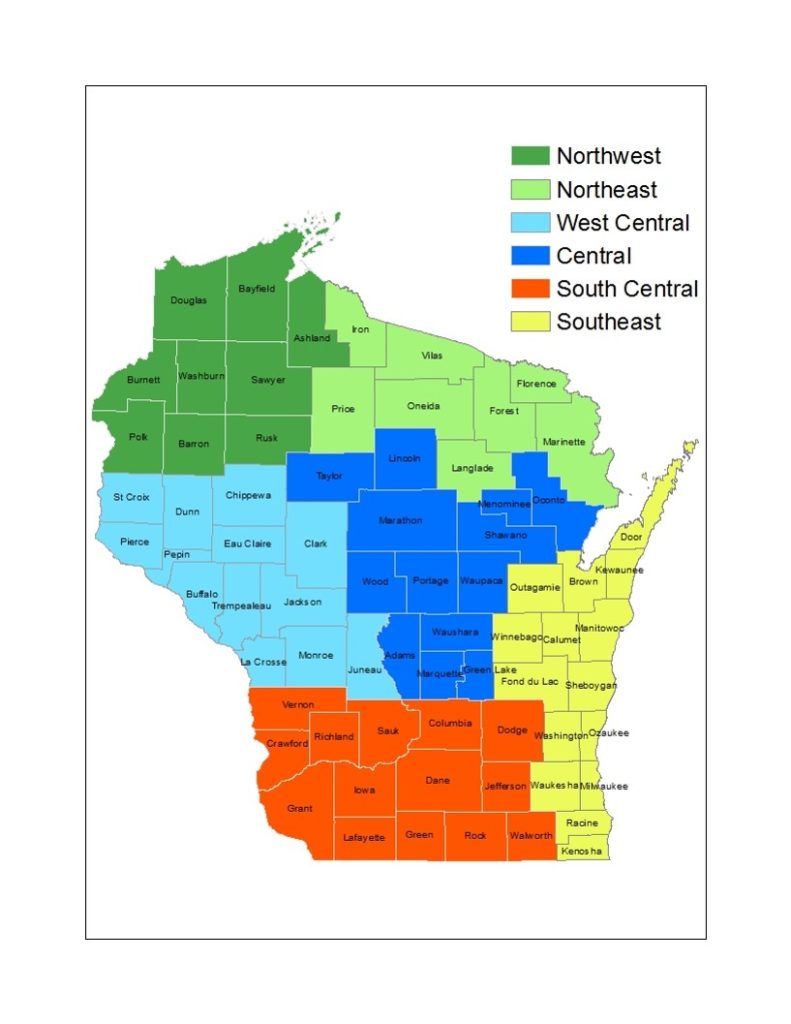by Jodie Ellis, communications specialist, Forest Health team (Madison)
Jodie.Ellis@Wisconsin.gov; 608-266-2172
The number of Forest Health (FH) specialist positions in the state was recently reduced by one, going from seven fulltime positions to six. To reflect this change, the forest health zonal map was restructured to spread coverage between five forest health specialists (the FH specialist position for the Central zone, while not eliminated, remains vacant). The new assignments went into effect on April 3, 2018.
To contact a forest health specialist, please refer to the revised map below:
- Northwest zone: Paul Cigan (Hayward), 715-416-4920, paul.cigan@wisconsin.gov
- Northeast zone: Linda Williams (Woodruff), 715-356-5211 x232, Linda.Williams@wisconsin.gov. Also covering Lincoln, Shawano, Menominee, Waupaca and Oconto counties in the Central zone
- West Central zone: Todd Lanigan (Eau Claire), 715-839-1632, todd.lanigan@wisconsin.gov. Also covering Taylor County in the Central zone.
- Southeast zone: Bill McNee (Oshkosh), 920-360-0942, bill.mcnee@wisconsin.gov
- South Central zone: Michael Hillstrom (Fitchburg, WI), 608-513-7690, michael.hillstrom@wisconsin.gov. Also covering Marathon, Wood, Portage, Adams, Waushara, Marquette and Green Lake counties in the Central zone.
- Central zone: vacant

Restructured Forest Health zones
A fulltime FH specialist position, which had been vacant, was eliminated as part of the reduction of six positions from the Division of Forestry in the recent state budget. Because of the increased work load on the five remaining FH specialists, the FH program has permanently reduced or eliminated some of its services to customers to keep the staff’s work load at manageable levels.
Program services that have been reduced or eliminated include:
- The DNR’s gypsy moth suppression program, which addressed population surges in areas of the state where gypsy moth is already established. This program was already in the process of being deactivated when the FH specialist position was cut. (NOTE: The Slow The Spread program, which is managed by the Wisconsin Department of Agriculture, Trade and Consumer Protection (DATCP), remains active. It targets gypsy moth populations in the western part of the state where gypsy moth has not yet established.)
- Site visits to confirm EAB at the township level (digital images will be used for identification instead)
- Site visits and digital diagnostics of small acreage (less than 10 acres) for private landowners
Forest Health team members must also reduce the number of outreach presentations provided to the public.
Please contact Rebecca Gray, Forest Health team leader, with any questions at Rebecca.Gray@wisconsin.gov or by phone at 608-275-3273.
